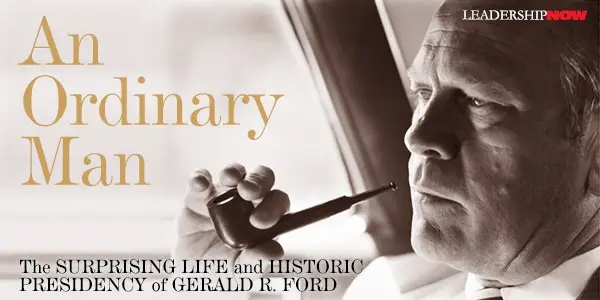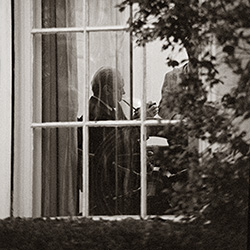 |
 |
05.09.23

An Ordinary Man: Gerald R. Ford
GERALD FORD was an inner-directed leader that gave him quiet strength. He didn’t indulge his ego. A leader with the courage to do what needed to be done despite the consequences. Richard Norton Smith’s extraordinary biography of Gerald Ford, An Ordinary Man, pulls together multiple perspectives to give essential insights into Ford’s thinking and leadership. Ford had moral authority because he lived his values. He believed that you could disagree without being disagreeable. Never taking himself too seriously and wanting to do what was best for the country, he recruited people who knew more than he did about the issues he faced. Ford possessed what Pulitzer Prize-winning author John Hersey called a “stubborn calm at the center” and “a glacial caution.” Curated below are some notes from An Ordinary Man: ☙ “The strongest weapon in a political campaign is the good credited you by word of mouth”—this Ford credo goes a long way toward explaining him and the congressional mindset he personifies. By stressing individual contacts over ideological mandates, Ford defines leadership in transactional terms, constituent service on a grand scale. ☙ When asked the secret of his political success, Ford reveals more than he perhaps intends by replying, “I made everyone else’s problems my problems.” ☙ “Ford never doubted the contribution of college sports to his character or career. Teamwork and grueling preparation were educational values in themselves. The discipline to absorb defeat without yielding to defeatism, to distinguish between constructive criticism and the shouted abuse of armchair quarterbacks—these and other lessons served Ford as guideposts in his political travels.” ☙ As a new congressman, “Ford could often be found at his desk on weekends as well. Frequently Betty joined him there, filing papers or just enjoying his company.” ☙ JFK beckoned to Gerald and Betty Ford to return to Washington on the presidential yacht Honey Fitz. That the Fords should find their names on the most exclusive guest list of the season was no accident. JFK had long since taken the measure of his one-time House colleague. He knew that Ford’s opinion carried weight among lawmakers of both parties, especially on issues of military spending and foreign aid. ☙ Representative Charles Goodall on Ford as Minority Leader: “Of course, he was a nice guy. Even his critics liked him … His secret was that he was almost totally non-vindictive, and he made the effort to make people feel that they were part of the leadership team.” ☙ With counselor Robert Hartmann, former Washington bureau chief for the Los Angeles Times, on the payroll, “Ford could indulge his habit of seeing the good in people, knowing he had another set of eyes to detect and defend against their less admirable qualities.” ☙ In pardoning Nixon, Ford said he had hoped “to change our national focus … to shift our attention from the pursuit of a fallen President to the pursuit of the urgent needs of a rising nation.” ☙ Ford said, “If there’s no place in politics for human compassion, there’s something wrong with politics.” ☙ In visiting Japan and South Korea, “He navigated minefields of controversy with a common touch and uncommon sensitivity to the feelings of his hosts.” ☙ He was “Paying for the mistakes of the last four decades, “Observed George Reedy, onetime White House press secretary to Lyndon Johnson. “He’s been run over by history.” ☙ “Presidents are judged in part by the company they keep, the talent they attract, and their ability to work with subordinates who may surpass them in IQ and charisma. ☙ Don Rumsfeld told Ford, “You know, as you look ahead, you have to have something that you are pushing for. Otherwise, you are not leading.” ☙ Approaching his first anniversary in the Oval Office, there was widespread agreement that the trappings of office had done nothing to inflate Ford’s ego. ☙ “Ford Is Mr. Right,” proclaimed Newsweek. “A kind of anti-hero whose homely virtues of thrift, honesty, hard work, and modesty about the capacities of government exactly suit a diminished national mood.” ☙ “Ford wasn’t that type of man. He wasn’t someone who attempted to sell things by packaging them for the media.” ☙ Ford said at the 1975 Helsinki conference, “History will judge this conference not by what we say today, but by what we do tomorrow—not by the promises we make, but by the promises we keep.” ☙ Clarence Mitchell, chief Washington lobbyist and spokesman for the NAACP, said of Ford that despite their political differences, “nothing will ever change the fact that you entered the office at a time when the Nation was in great travail, and you left it with the respect and, in many instances, the affection of your supporters and many of your opposition as well.” ☙ Harry McPherson, Lyndon Johnson’s White House counsel, wrote, Ultimately Ford had been a successful president not because he was clever, articulate, or a man of vision, “but because he was honest, straightforward, forgiving and possessed of sound judgment.” ☙ Acknowledging his contemporary opposition to the Nixon pardon, Ted Kennedy said, “Time has a way of clarifying past events, and now we can see that President Ford was right.”  
Posted by Michael McKinney at 05:08 PM
|
BUILD YOUR KNOWLEDGE
 

How to Do Your Start-Up Right STRAIGHT TALK FOR START-UPS 
Grow Your Leadership Skills NEW AND UPCOMING LEADERSHIP BOOKS 
Leadership Minute BITE-SIZE CONCEPTS YOU CAN CHEW ON 
Classic Leadership Books BOOKS TO READ BEFORE YOU LEAD |